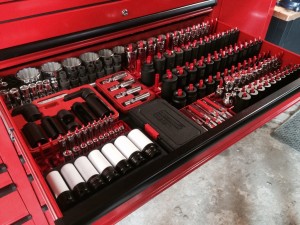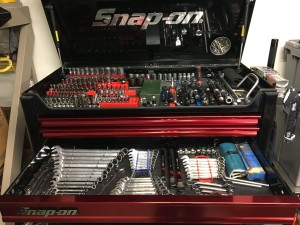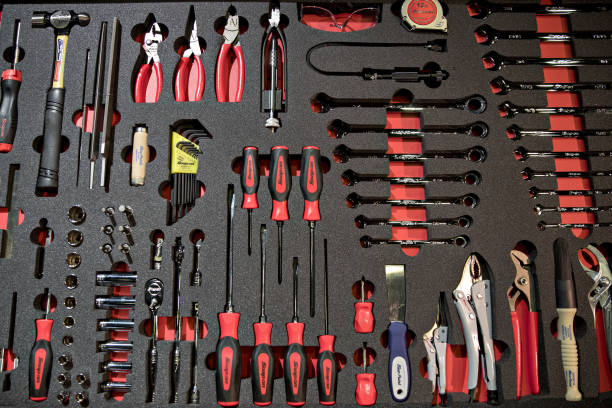Whether it’s a broken car, furniture or appliance, people look for the right tool to complete a repair. Snap-on provides high-quality tools for repair professionals and weekend handymen alike. This unique franchise brings 22,000 exclusive and premium-grade tools to the doorstep of their customers with their mobile showroom that can deliver product to any residential or commercial location. Founded in 1920, Snap-on has grown into the world’s #1 tool brand with more than 4,700 franchises in 130+ countries. There are an estimated 3,400 franchise units in US alone.
How much will it cost to open a Snap-on tool franchise? Expect the total investment for this franchise to cost between $217,505 – $481,554. To qualify you must have a net worth and liquid capital of $44,121 – $64,636. The initial franchise fee costs at least $12,000 – $16,000 depending on location.
But before you sign on the dotted line of a franchise agreement, Snap-on has it’s fair share of negative reviews online. I’ll explain these franchisee concerns and break-down all the fees associated with starting the business in this review. Take our 7-minute franchise quiz here to get matched with the right opportunity.
Page Contents
- Financial Requirements and Fees
- Average Sales/ Revenue per Year
- What’s the Failure Rate of the Snap-on Franchise?
- Matco Tools vs. Snap-on Franchise
- Franchise Facts
- How Much Profit Do Snap-on Tools Franchise Make Per Year?
- What’s the Average Salary of a Snap-on Franchisee?
- Advantages Of Owning Snap-on
- Challenges Of Franchising Snap-on
- Is the Snap-on Franchise Right For You?
Financial Requirements and Fees
In this section, I’m going to break down the startup costs of a Snap-on. But before we dive in, let me explain some of the more technical terms to understand the estimates better.
- Liquid capital refers to the entire amount of cash you will need on hand and is available to use at any time.
- Net worth refers to the value of all your non-financial and financial assets minus the value of all your outstanding liabilities.
- Total investment is the total capital or the total money you will need to put into the franchise over time to get it up and running.
- Finally, a franchise fee refers to the amount you must pay to the franchisor to use its brand and resources.
Below is an overview of the Financial Requirements and Fees of Snap-on:
| Financial Requirements and Fees | Amount |
| Liquid Capital | $44,121 – $64,636 |
| Net Worth | $44,121 – $64,636 |
| Total Investment | $217,505 – $481,554 |
| Franchise Fee | $12,000 to $16,000 |
Snap-on Incorporated has a significantly lower franchise fee compared to the average franchise fee in the auto repair business or pretty much any other industry. The typical franchise fee in this industry ranges from $20,000 to $50,000. But for only $12,000 to $16,000 in some markets, you could pay the franchise fee for Snap-on for 10 years. This lowers the barrier to entry for more operator who want to run this business. If you want to extend the franchise agreement further, you have the option to add five more years to your contract as you pay the renewal fee which costs 50% of the then-current initial license fee.
If you’re a veteran, you’ll be granted a $20,000 discount on the cost of your initial tool inventory too. Your veteran discount equity may also be considered you utilize their affiliate Snap-on credit to finance the business. This can make the funding process easier since the lender will understand the risks and opportunities of the franchise.
Snap-on has no ongoing fees such as royalty, advertising, and marketing fee. They only have a monthly management fee that is $560 at the time of this writing.
Average Sales/ Revenue per Year
Below is an overview of the average revenue of Snap-on and a brief analysis of its profitability.
| Average Sales/Revenue Per Year | Amount |
| Systemwide Annual Sales | $4.730 billion (as of 2023) |
| Average Annual Sales per Unit | $1 million |
| Average Franchisee Profit | $2.349 billion (2023) |
Snap-on is a top-performing tool brand with high sales volume potential. As of 2023, the company brought in $4,730,000,000 in revenue with a 5.28% increase from 2022. According to the company’s website, they have at least 4,700 units operating worldwide. Taking that into account, the typical franchise grosses $952,083 annually. Keep in mind the gross sales number does not reflect the profit the typical franchisee will bring in.
Not Sure What Franchise to Start? Take Our 7-Minute Franchise Business Quiz!
On average, Snap-on has a gross profit of $2.349 billion. While this may sound promising, keep in mind that the performance of your business may fluctuate depending on the circumstances. You should also expect the first 1 – 2 years of business performance to be slower as you build a base of local customers.

Featuring Snap-on Tools Socket Drawer
What’s the Failure Rate of the Snap-on Franchise?
I visited a half dozen websites and reached out to numerous franchisees to understand what folks have to say about the failure rate of the Snap-on franchise. Obviously, with a franchise opportunity this large there, you should expect to see a certain number of failures. Even McDonald’s, one of the greatest franchise opportunities of all time has its share of failed locations. Still, I believe it’s smart to look at the good and bad experiences from franchisees before investing in any business so you know what to expect.
The first franchise review concluded that Snap-on was a low-risk opportunity that offers high profitability. Although a decline of franchisee-owned units in several years was observed, it wasn’t an alarming case. By the end of 2018, the total outlets went declined from 3,461 to 3,433, which translates to a 0.8% failure rate. The number of franchise units recovered by 2019 as they opened 33 new outlets. But in 2020, Snap-On Tools once again saw a 0.69% failure as total outlets declined.
The recent failure rate of Snap-on does not create a cause for concern that the business model isn’t healthy. With the number of franchisee’s reaching into the thousands, you could anticipate a handful of closures each year. Everyone’s situation is different and some franchisees could be calling it quits for a variety of reasons like retirement.
On the flip side, a forum discussion from 2015 highlights a few reasons why getting a Snap-on franchise is not a good business decision. Considering that there were around 3,000 franchises at that time, one contributor speculated the brand’s failure rate was 10% because they were reacquiring 250 to 300 franchises every year. They assumed that the reason behind the decline was the overpriced products that may leave entrepreneurs in debt if their customers didn’t purchase the tools.
Finally, an article from 2019 declared a failure rate of over 40% as the author went through the experiences of Snap-on dealers. Based on the testimonies, Snap-on wasn’t an avenue for growth. They limit your market to the list of 200 customers that they provide and don’t allow you to have a second route and capping your sales volume. However, there seems to have been an improvement. At present, the failure rate of a Snap-on franchise is unofficially estimated at 0.55% in the year 2022.
I highlight these concerns, not to discourage you at all. But these are questions I would get clarity on from the franchise rep while going through the application process.
Matco Tools vs. Snap-on Franchise
Matco Tools and Snap-on tools are both award-winning manufacturers and distributors of tools and equipment for different industries worldwide. Matco offers premium tools and storage equipment for mechanics and auto enthusiasts and has been in business since 1979.
There are more than 13,000 professional-level repair and maintenance products that Match produces and sells in addition to service and support. Below is an overview of the key differences between these two competitors in the tool space.
| Matco Tools | Snap-on | |
| Year Founded | 1979 | 1920 |
| Investment | $77,236 – $313,646 | $217,505 – $481,554 |
| Franchise Fee | $8,000 | $12,000 – $16,000 |
| Royalty Fee | 0 | 0 |
| Renewal Fee | 0 | 50% of the current license fee |
| Experience | Industry experience, general business experience, marketing skills | – |
| Term of Agreement | 10 years | 10 years |
Snap-on tools is an older yet more expensive franchise option compared to Matco Tools. The total investment to open a Matco franchise is usually $77,236 – $313,646. Matco doesn’t require a royalty fee or renewal fee either. But unlike Snap-on, they require related experience in the tool industry, business, and marketing school. The standard term of agreement between both parties is 10 years.
If you want to start a business in this industry, it would make sense to contact both companies to compare. Additionally, your desired territory might only be available locally with one of the companies. It’s always good to understand and evaluate all options before moving forward with a longterm agreement.

Snap-on Tools Collection and Box.
Franchise Facts
Here are facts about Snap-on tools that will help you get to know the brand better.
| Year Founded | 1920 |
| Total Units | More than 4,700 |
| Industry | Manufacturing |
Snap-on was founded in 1920 in Milwaukee, Wisconsin by the innovation of Joseph Johnson and William Seidemann. Believing in the slogan “5 do the work of 50”, they manufactured a multi-function and efficient socket and introduced it to professional auto mechanics. They initially marketed their product by demonstrating the usefulness of their tools in front of customers. When Newton Tarble was hired after World War II, they began developing routes for company dealers. In 1991, they expanded their horizons through franchising and became the one of the top producers of high quality tools in the world.
Snap-on Incorporated is also in a growing industry. The General Manufacturing industry is expected to grow at a CAGR of 1.7% from 2020 to 2027. This industry will require more tools over the next half decade. As of 2020, estimated valued of this global market was valued at $649.8 billion. Snap-On continues receive high-marks across publications like Entrepreneur Magazine:
- Featured in Entrepreneur’s Hall of Fame 2023
- Top Franchise for Veterans
- Franchise Business Reviews’ Top Franchises of 2024
How Much Profit Do Snap-on Tools Franchise Make Per Year?
Here’s how much Snap-on franchise operators were paid in 2020. As you can see there is a wide range of annual profit per operator. But the good news is, the sky is the limit in terms of getting paid with this opportunity. As you can see, 364 operators brought in $1 million or more in a single year in 2020 alone. Keep in mind these figures are before considering the annual costs of operating the business.
- 79 franchisees made $249,000 or less. (2.67% of total franchisees)
- 686 franchisees made $250,000 – $499,999 (23.25% of total franchisees)
- 1,153 franchisees made $500,000 – $749,999 (39.07% of total franchisees)
- 669 franchisees made $750,000 – $999,999 (22.67% of total franchisees)
- 329 franchisees made $1 million – $1.49 million (11.15% of total franchisees)
- 32 franchisees made $1.5 million – $1.99 million (1.08% of total franchisees)
- 3 franchisees made $2 million or more (0.10% of total franchisees)
However, for a more recent unofficial estimate, Glassdoor reports that Snap-on franchise owners earn $78,000 to $139,000 a year.
What’s the Average Salary of a Snap-on Franchisee?
A Snap-on franchisee earns $24.78/hr. A week of work would earn you $991/week which accumulates to $4,295/month or $51,540/year. Of course, Snap-on franchisees may earn lower or higher than that. As of 2023, the salary here ranges from $78,000 to $139,000 a year.
As you can see, however, the estimates like this only tell part us of the story. Your personal skill set, location, experience, and the overall economic health will determine the actual income you make each year.
Advantages Of Owning Snap-on
Here’s a list of reasons why a Snap-on franchise may be beneficial for you.
- Upside Potential: When you join a franchise, you want the potential to earn a great living to be there. After all, if you can’t make an above average salary, why take on all this risk as an entrepreneur? Fortunately, Snap-on gives entrepreneurs to earn more than $1 million dollars annually if you’re on of their top producers.
- Strong Ubiquitous Presence: More than 4,800 Snap-on franchise units can be found in 130 countries. In the United States alone, 3,400 mobile retail showrooms are roaming. Snap-on has proven its brand to the market for nearly a century; hence, you no longer have to struggle to build your presence out there.
Franchise Review: How Much Will It Really Cost to Open a Dave and Buster’s Franchise?
- Premium Grade Products: Snap-on has been recognized as the “Overall Best Power Tools” in the United States. Customers love their high-end, versatile products so much they ranked #1 in Tools Distribution from 2021-2022. They also offer a vast selection, with over 22,000 products for various purposes.
- Mandatory Training and Upskilling: Snap-on makes sure you’ll be able to handle the responsibility of being a franchise owner. They offer Management Training which consists of 84 hours of classroom training and 135 hours of on-the-job training. Even if you are not yet experienced, this franchise is still an option for you.
Challenges Of Franchising Snap-on
Here are some of the challenges you should expect to face in this company.
- Limited Entrepreneurial Growth: Mobile trucks indeed give you the freedom to seek where the demand is but that may not be possible in this franchise. Snap-on is pretty strict on the list of customers you may have business with and the route where you can go. If you’re looking for growth opportunities, you may find Snap-On’s business model as annoying.
- Overpriced Products: Snap-on tools are expensive for a reason but customers have proven they are willing to pay for quality. While every consumer wants to get a good value, the fact is quality products cost more to produce.
- Snap-On Credit Issues: While credit can be convenient especially if you don’t have enough money to start a business, it can be troublesome. Snap-on has been in conflict with some of its franchise owners who complained about being trapped in a cycle of debt. They charge their borrowers an interest rate of 17.9% to 19.5%. People in forums have advised interested customers to not invest their savings into the business because of its inconsiderate lending scheme.
- Lawsuit Records: Franchise owners had accused Snap-on of various legal issues that lead to the failure of their franchises. Allegations of slander, defamation, breach of contract, and even fraud were made against them. Here’s a sample of a filed case.
Is the Snap-on Franchise Right For You?
There’s no one perfect franchise that checks all the boxes for everyone. Snap-on franchise is a well suited opportunity for someone with strong sales skills and experience with tools. But keep in mind, even if you do have these skills, the best routes or territories could be already be claimed.
Does this Snap-on seem like a good opportunity to you? Let me know by replying on social media. I always love to get feedback from our readers on these reviews.





